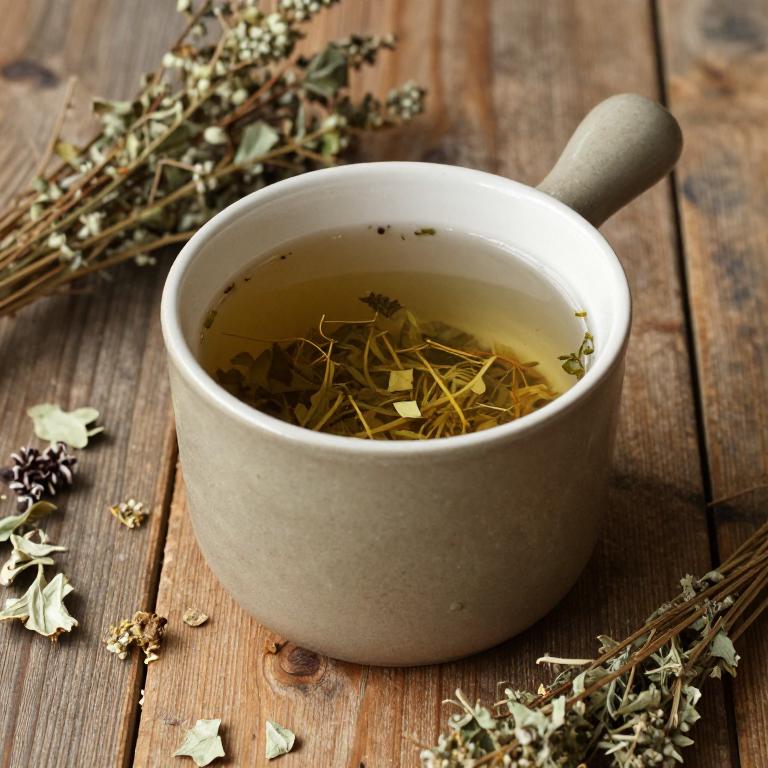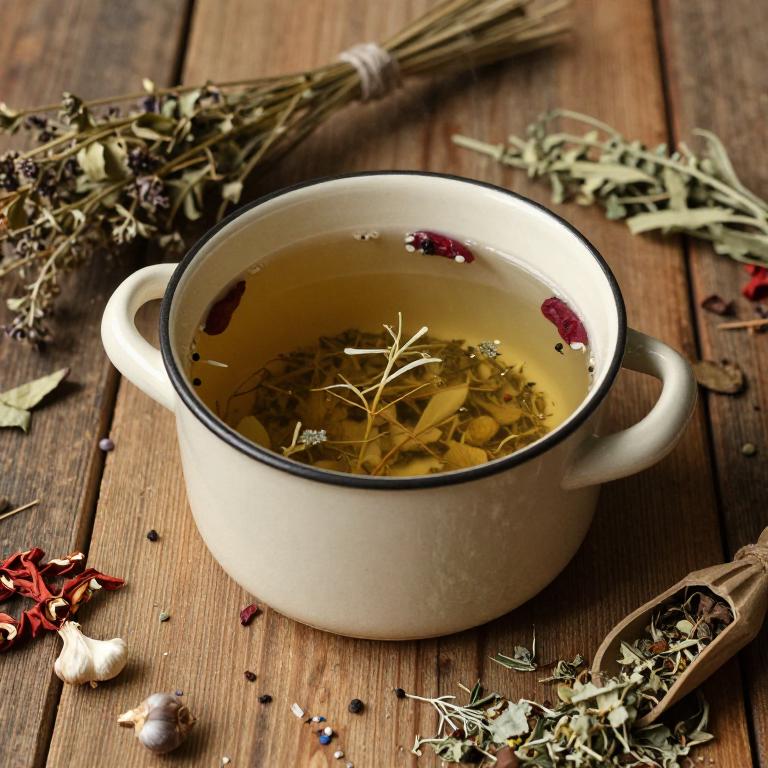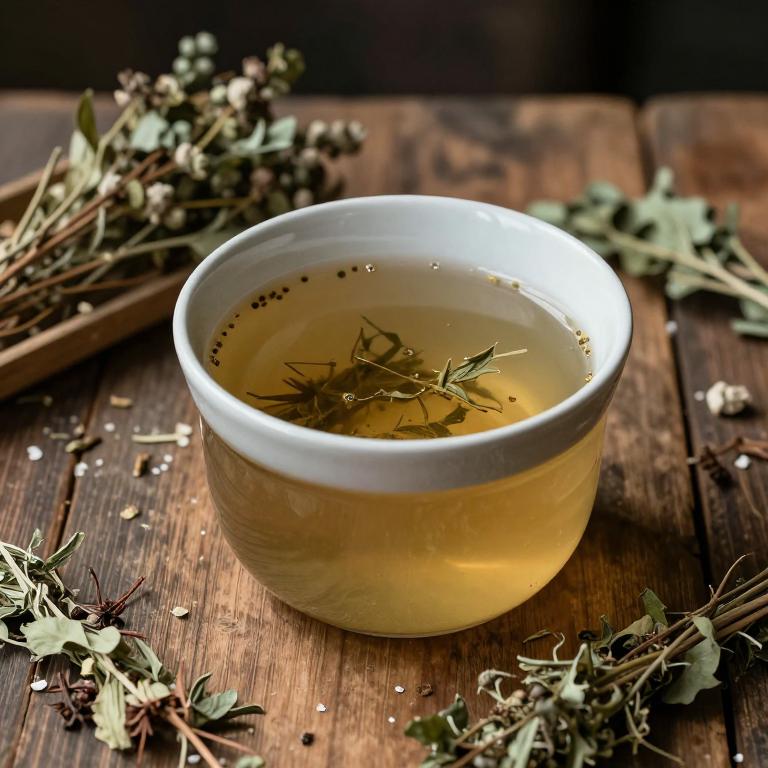10 Best Herbal Decoctions For Eczema

Herbal decoctions have been traditionally used to alleviate symptoms of eczema by promoting skin health and reducing inflammation.
Common herbs such as chamomile, calendula, and licorice root are often included in these decoctions due to their soothing and anti-inflammatory properties. To prepare a decoction, the herbs are simmered in water for an extended period to extract their active compounds, which can then be applied topically or consumed internally. These natural remedies are generally considered safe but should be used under the guidance of a healthcare professional, especially for individuals with known allergies or chronic conditions.
While herbal decoctions may offer relief for some eczema sufferers, they are often used as complementary treatments rather than standalone solutions.
Table of Contents
- 1. Stinging nettle (Urtica dioica)
- 2. St. john's wort (Hypericum perforatum)
- 3. Aloe vera (Aloe barbadensis)
- 4. Field horsetail (Equisetum arvense)
- 5. English lavender (Lavandula angustifolia)
- 6. Thistle (Silybum marianum)
- 7. German chamomile (Chamomilla recutita)
- 8. Tree peony (Paeonia suffruticosa)
- 9. Chamomile (Matricaria chamomilla)
- 10. Camellia (Camellia sinensis)
1. Stinging nettle (Urtica dioica)

Urtica dioica, commonly known as stinging nettle, has been traditionally used in herbal medicine for its potential anti-inflammatory and antihistaminic properties.
A decoction of dried stinging nettle leaves can be prepared by simmering them in water for about 15 to 20 minutes, allowing the beneficial compounds to infuse into the liquid. This herbal decoction is often recommended for topical application to soothe skin irritation and reduce symptoms of eczema. Some studies suggest that the high concentration of minerals and antioxidants in nettle may help strengthen the skin's barrier function.
However, it is important to consult a healthcare provider before using nettle decoctions, especially for those with allergies or sensitive skin.
2. St. john's wort (Hypericum perforatum)

Hypericum perforatum, commonly known as St. John's wort, has been traditionally used in herbal medicine for its potential anti-inflammatory and antimicrobial properties.
When prepared as a decoction, the plant's leaves and flowers are boiled to extract bioactive compounds such as hypericin and hyperforin, which may help reduce skin inflammation associated with eczema. Some studies suggest that St. John's wort may modulate immune responses and inhibit the production of inflammatory cytokines, potentially offering relief for eczema symptoms. However, it is important to note that the effectiveness of hypericum perforatum decoctions for eczema can vary, and individual responses may differ.
As with any herbal treatment, it is advisable to consult a healthcare professional before use, especially since St. John's wort can interact with certain medications.
3. Aloe vera (Aloe barbadensis)

Aloe barbadensis, commonly known as aloe vera, has been traditionally used for its soothing and anti-inflammatory properties, making it a popular ingredient in herbal decoctions for eczema.
These decoctions typically involve boiling the gel or leaves of the aloe plant to extract its active compounds, such as polysaccharides, enzymes, and antioxidants. The anti-inflammatory and moisturizing effects of aloe barbadensis may help reduce redness, itching, and skin irritation associated with eczema. However, it is important to note that while some individuals may find relief using aloe-based remedies, scientific evidence supporting its efficacy for eczema is limited, and it should not replace prescribed medical treatments.
As with any herbal remedy, it is advisable to consult a healthcare professional before incorporating aloe barbadensis into an eczema treatment regimen.
4. Field horsetail (Equisetum arvense)

Equisetum arvense, commonly known as horsetail, has been traditionally used in herbal medicine for its high silica content, which is believed to support skin health.
Herbal decoctions made from the dried stems of Equisetum arvense are often prepared by boiling the plant material in water for an extended period to extract its active compounds. These decoctions are sometimes used externally as a wash or compress to alleviate symptoms of eczema, such as dryness and inflammation. However, while some anecdotal evidence suggests potential benefits, scientific research on its efficacy for eczema remains limited.
It is important to consult with a qualified healthcare provider before using horsetail decoctions, as they may interact with other medications or cause allergic reactions in some individuals.
5. English lavender (Lavandula angustifolia)

Lavandula angustifolia, commonly known as English lavender, has been traditionally used in herbal medicine for its soothing and anti-inflammatory properties.
Herbal decoctions made from dried lavender flowers are often prepared by simmering the plant material in water for several minutes, resulting in a calming infusion that can be applied topically or consumed internally. These decoctions are believed to help alleviate symptoms of eczema by reducing skin irritation, redness, and itching due to their high content of essential oils and flavonoids. Studies suggest that lavender's antimicrobial and antiseptic qualities may also support skin healing and prevent infections in eczema-prone skin.
As a complementary therapy, lavender decoctions are often recommended alongside conventional treatments to enhance overall skin health and comfort.
6. Thistle (Silybum marianum)

Silybum marianum, commonly known as milk thistle, is a herb that has been traditionally used for its potential therapeutic properties, including its anti-inflammatory and antioxidant effects.
Herbal decoctions of Silybum marianum are often prepared by boiling the dried seeds in water to extract its active compounds, such as silymarin. These decoctions may help alleviate symptoms of eczema by reducing skin inflammation and promoting healing. However, while some anecdotal evidence supports its use, more rigorous scientific studies are needed to confirm its efficacy for eczema treatment.
As with any herbal remedy, it is advisable to consult a healthcare professional before incorporating Silybum marianum into a treatment regimen for eczema.
7. German chamomile (Chamomilla recutita)

Chamomilla recutita, commonly known as German chamomile, has been traditionally used for its anti-inflammatory and soothing properties, making it a popular choice for herbal decoctions aimed at treating eczema.
When prepared as a decoction, the active compounds such as flavonoids and essential oils in chamomile help reduce skin irritation and inflammation associated with eczema. This herbal remedy is often applied topically in the form of a compress or bath to alleviate symptoms like redness, itching, and dryness. While it is generally considered safe for external use, individuals with allergies to plants in the daisy family should exercise caution.
Clinical studies suggest that chamomile decoctions may provide relief for eczema symptoms, though they should be used as a complementary therapy alongside conventional treatments.
8. Tree peony (Paeonia suffruticosa)

Paeonia suffruticosa, commonly known as tree peony, has been traditionally used in Chinese medicine for its anti-inflammatory and skin-soothing properties.
Herbal decoctions made from its roots are often prescribed to treat eczema due to their ability to regulate the body's internal balance and reduce allergic reactions. These decoctions are typically prepared by boiling the dried root in water for several hours, resulting in a potent and calming tonic. Clinical studies suggest that the compounds in Paeonia suffruticosa may help alleviate symptoms such as redness, itching, and dryness associated with eczema.
However, it is important to consult a qualified practitioner to ensure proper usage and to avoid potential interactions with other medications.
9. Chamomile (Matricaria chamomilla)

Matricaria chamomilla, commonly known as chamomile, has been traditionally used for its soothing and anti-inflammatory properties, making it a popular herbal remedy for eczema.
Chamomile herbal decoctions, prepared by steeping the dried flowers in hot water, can be applied topically or consumed internally to support skin health. The active compounds in chamomile, such as bisabolol and flavonoids, help reduce redness, itching, and irritation associated with eczema. Studies suggest that chamomile may modulate the immune response and reduce oxidative stress, contributing to its efficacy in managing eczema symptoms.
However, it is advisable to consult a healthcare professional before using chamomile, especially for individuals with allergies or those taking other medications.
10. Camellia (Camellia sinensis)

Camellia sinensis, commonly known as the tea plant, has been traditionally used in herbal medicine for its potential therapeutic properties, including its anti-inflammatory and antioxidant effects.
Herbal decoctions made from Camellia sinensis leaves, such as green or black tea, are sometimes used to alleviate symptoms of eczema due to their ability to reduce skin irritation and promote healing. These decoctions may contain bioactive compounds like polyphenols and catechins, which have been shown to modulate immune responses and reduce inflammation. However, while some studies suggest possible benefits, more clinical research is needed to confirm their efficacy and safety for eczema treatment.
As with any herbal remedy, it is important to consult a healthcare provider before using Camellia sinensis decoctions, especially for individuals with existing health conditions or allergies.